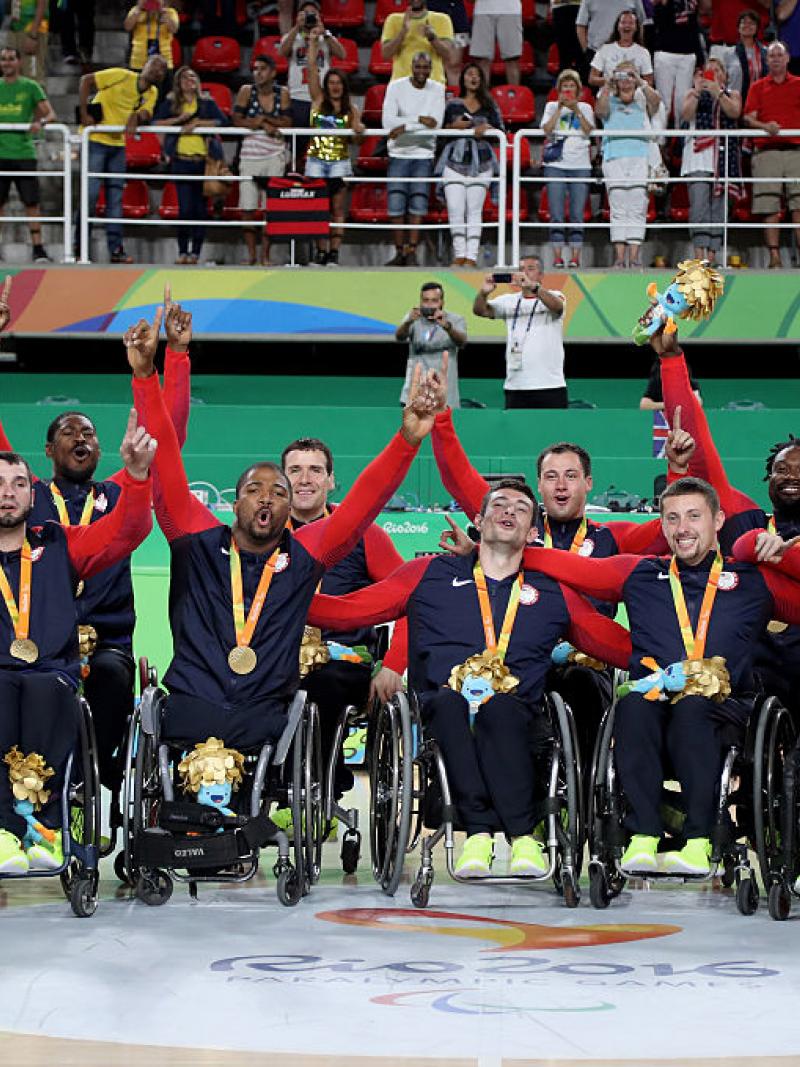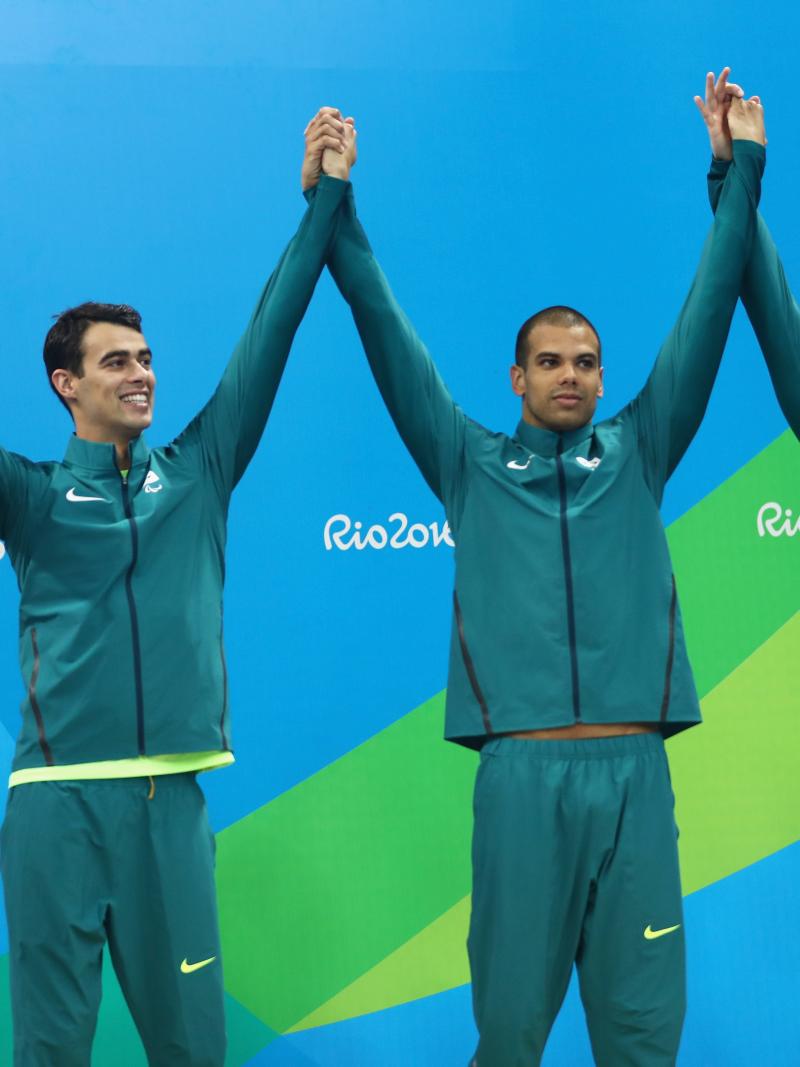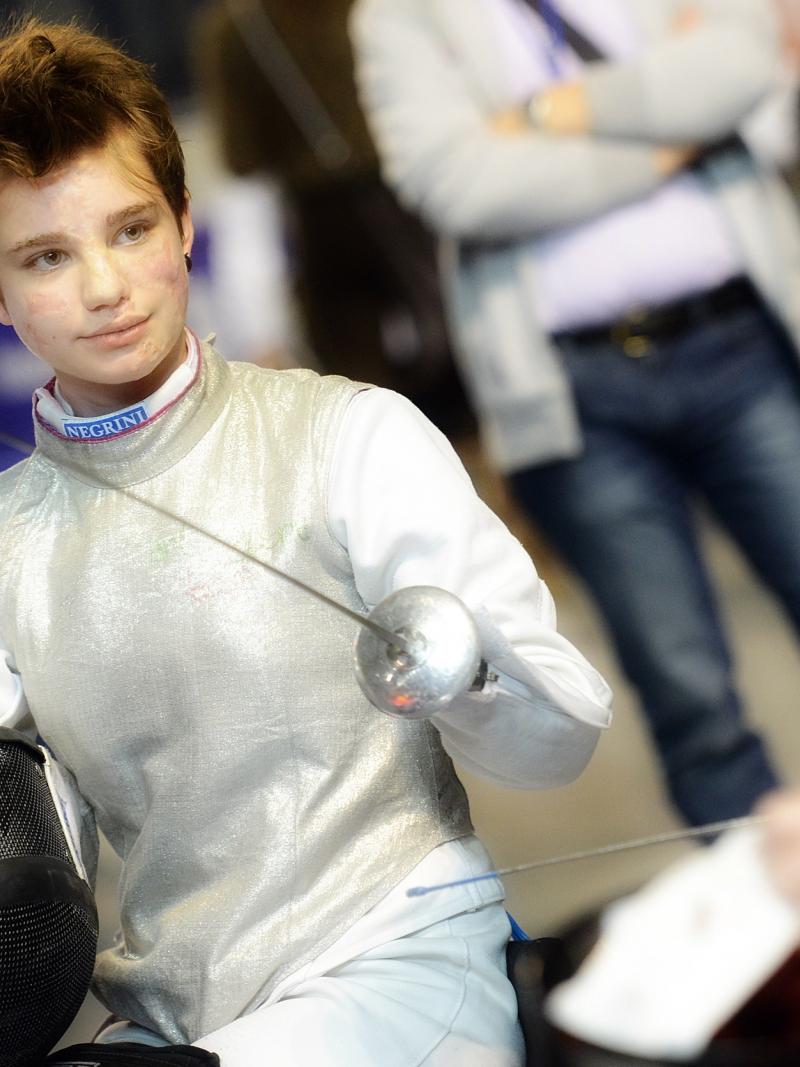Wheelchair basketball Rio 2016 wrap-up
In a nutshell, here is what happened in the sport at the Paralympic Games in Rio. 29 Sep 2016
The USA's Trevon Jenifer tries to keep the ball away from the defence during the men's wheelchair basketball finals against Spain at the Rio 2016 Paralympic Games.
From double dominance on the US side to overtime thrillers, here is a look back at what happened in wheelchair basketball at the Rio 2016 Paralympic Games.
The USA’s journey to the top of the wheelchair basketball scene was completed when both the men’s and women’s teams won gold at Rio 2016. It was the first time a country has won the double since Canada at Sydney 2000. The women were motivated by missing out on a podium finish at London 2012 to reclaim the titles they won at Beijing 2008 and Athens 2004. Meanwhile the men broke a 28-year gold medal drought through a superfluous display against every opposition. Both teams went through the tournament undefeated.
Led by co-captains Steve Serio and Michael Paye, the men were ruthless in their attack, winning by margins of 68 points on Algeria, 49 points on Iran and 37 points on host nation Brazil in their group B matches. Jake Williams and Brian Bell led the team’s scoring as USA put on 614 tournament points to their opponent’s mere 349. Their lowest winning margin all tournament was 16 points in the final against Spain.
Their gold medal opponents, Spain were one of the surprise packages, finishing atop group A with four wins and a loss. They beat medal hopefuls Australia in the group stage, Germany in the quarter-final, and then Great Britain for a place in the showpiece. Alejandro Zarzuela scored 147 tournament points leading a well-rounded team effort where 145 points came from bench players and 99 points from turnovers. There were emotional scenes when they were the first team to qualify for the gold medal match having gone from well outside the podium finishes at both the 2015 European and 2014 World Championships, to realising they were playing to medal for the first time in their Paralympic history.
Spain’s only other loss came to Turkey, who also finished the group stages with four wins and a loss. Led by tournament top-scorer Ozgur Gubalak, (171 points in almost five hours of court time) and Ferit Gumut (averaged 34 minutes per match), Turkey came very close to being on the podium for the first time. They fell to Great Britain in overtime of the bronze medal match. Around 8,600 people at the Rio Olympic Arena held their breath in the final minute of regulation when Turkey desperately tried to defend a two-point lead. British veteran Terry Bywater calmly found the basket to draw level at 65-65 to send the game into another period. In what was perhaps the match of the tournament, Turkey were unable to defend their OT lead, with a determined British side jubilant to finish in third and go one better than their London 2012 disappointment.
There was a carnival like atmosphere at every game in both the Rio Olympic Arena and Carioca 1, with fans bringing the noise to new levels every time host Brazil took the court. The men’s team finished fifth in the overall standings, one ahead of the Australian side. The Netherlands, Germany, Japan and Iran rounded out the top 10 finishes in the men’s. London 2012 gold medallists Canada have a long road of rebuilding as they left Rio without a win.
For the women, 28-year-old Rebecca Murray scored a whopping 169 points across her seven games in the tournament to become the women’s top scorer. Along with the three-time Paralympian, Rose Hollermann, captain Gail Gaeng, Desiree Miller, and Darlene Hunter all scored more than 120 individual points each, to beat their combined opponents 505-296.
The USA opened their Paralympic campaign with a thumping 93-37 win over France before mercilessly beating China by 34 and Algeria by 50 in the group stages. The closest any country got to beating the Group B winners were the Netherlands 60-50. The US were just as dominant in the finals stages. The home crowd could not spur on Brazil to victory, nor could a Great Britain outfit, who were having their best Paralympic tournament to come close to the USA’s class in the semi-finals. Germany was also kept quiet in the gold medal match with Gesche Schunemann topping her team’s scoring with 13 points and six assists, whereas USA’s Murray was almost unstoppable shooting at 80 per cent from the free throw line and scoring 12 from 20 attempts from the field in her game-high 33.
The much anticipated European matchup of heavyweights Germany and Netherlands occurred in the semi-finals. Both sides had a similar progression in the tournament, finishing the group stages with three wins and a loss, then a one-sided quarter-finals encounter.
But the gold medal qualifier was always going to be close. A nervous start by the Dutch had Germany with an early advantage and they maintained their lead throughout. German high-pointer pointer Mareike Miller and team captain Marina Mohnen both picked up double-doubles, while for the Netherlands’ Mariska Beijer, who averaged 19 points per game all tournament, was kept unusually quiet with only eight points. Germany were victors 55-45 sending the Netherlands to the bronze medal match against Great Britain.
The British had won their quarter final clash 57-38 against China to reach the semi-final stages of the tournament for the first time in their history, but struggled to get on the board against a very focused Dutch side, with no player tallying double digits in the points, rebounds or assists column. Whereas Beijer and 4.5 class Inge Huitzing put on a combined 39 points to help the Netherlands round out the medal placings.
Great Britain leave Rio disappointed on missing the podium but will be buoyed by reaching the medal stages. Also impressive throughout the tournament were China, who despite finishing in sixth after a loss to Canada in the 5-6 placed playoff take away big wins against France and Algeria in the group stages. Host nation Brazil ended their best ever Paralympic performance in seventh, one ahead of France.

 Facebook
Facebook
 Instagram
Instagram
 Twitter
Twitter
 Youtube
Youtube
 TikTok
TikTok
 Newsletter Subscribe
Newsletter Subscribe



